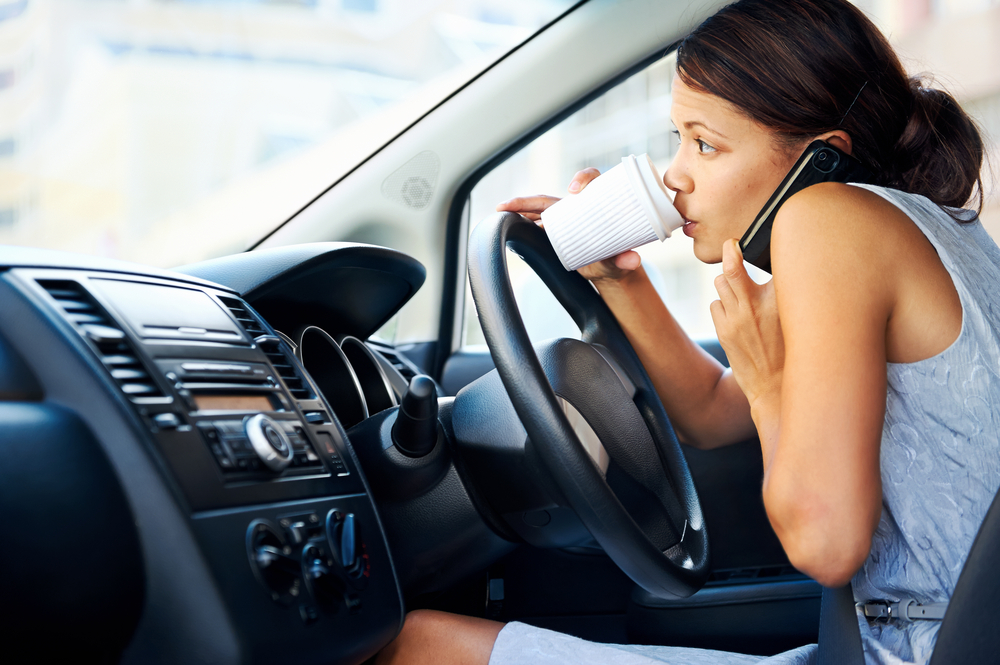Australia already has some of the world’s most prohibitive rules around using mobile phones while driving. They’re set to get worse, though, following a review by Australia’s National Transport Commission.
As it stands today, the law (in most states) allows drivers to use their mobiles while driving to accept or make calls, to play music, or to use navigation functions, provided the phone is in a hands-free holder.
What are the rules, precisely?
Wording varies slightly, but generally the rules are as follows:
Using a phone while driving is prohibited, except to make or receive a call or to listen to music or other audio – and only then if:
- the phone is in an affixed, commercially designed holder, or
- can be operated without the driver touching any part of it, and isn’t on the driver’s body.
Using a phone to navigate while driving is prohibited unless it is in an affixed holder.
All other functions (including video calls, texting and emailing) are illegal.
It is also prohibited when the vehicle is stationary but not parked, for example while stopped at traffic lights.
Those exemptions have existed for a little while now, but there’s two key facts here:
- Many drivers don’t understand the rules, or disregard the rules anyway
- Any use of smart devices while driving takes attention off the road
For these reasons, the NTC is warning that use of any devices could be distracting drivers and putting lives at risk.
Are the rules even clear?
The road rules, which aren’t frequently updated to keep pace with technology, refer to “visual display units” and mobile phones, but other devices which could skirt the rules don’t appear to be covered. Your smartwatch, for example, isn’t likely to be classified as a mobile phone (unless it has cellular connectivity built-in), but can be incredibly distracting if used while driving.
The laws are fairly clear, but interpretation (and misunderstanding) varies wildly. Melbourne newspaper The Age was advised by Victoria Police that touching a phone to make a call was illegal, even in a holder. This advice was later revised, following consultation with VicRoads’ official advice.
Drivers frequently skirt the rules too. On any drive around Sydney, it’s common to see drivers interacting with their mobiles sending text messages, playing Pokemon Go, reading the news, and so on. None of these activities is permitted. Bringing Android Auto into the mix makes things more confusing; while you’re not legally allowed to use a mobile phone to send messages, you can do so by voice with Google Assistant on Android Auto quite easily (“Hey Google, send a text message to Rachel I’ll be home late, stuck in traffic”). Is that legal? It seems not, but a lot of people do it.
The gig economy is being caught up in this confusion as well; Uber’s app, for example, relies on drivers being able to interact with it to accept fares and close them off at the conclusion of a journey. To legally do so, a driver would have to pull over and park to use the app, and while that’s easily done, in practice, it rarely happens.
Are the rules consistently applied?
Yes and no. Some states police these rules more effectively – Victoria Police are quite unrelenting when it comes to mobile use – whereas NSW Police seem to enforce the rules a little more flexibly. Generally, highway patrol officers are specifically on the look out for mobile phone use (as well as speeding, registration and drink driving issues), whereas general duties police seem to pay much less attention, provided it’s not obviously illegal (e.g. you’re holding your phone to your head, or playing with your phone in your lap).
There are also exemptions for police (and some other emergency workers) which allow them to use mobiles while driving for whatever reasons they want, including texting, calling, looking at maps, or even playing games (the law doesn’t say what activities are exempted). Unless police officers are some sort of super human multi-taskers (the evidence suggests they aren’t), their use of mobiles is just as dangerous as anyone else’s, and yet they remain exempt from the ban.
What’s good for one is good for the other, surely… but I digress.
How do you find these rules?
I don’t really find these rules to be all that difficult to comply with; I rarely use my phone while driving to do anything more than plug into Android Auto to display a map and play some music. Occasionally I’ll get calls while I’m on the road, or I’ll call my parents when on a longer drive as it’s a good time for a chat.
Google Maps has improved significantly in recent times, integrating music and calling functions directly into the app to make it easier to arrive alive.
Do you text and drive? Do you think banning mobile use entirely is appropriate? Let us know in the comments.





And yet they have not banned smoking in the car, reaching for a lighter (electric or other) then getting the packet, opening, finding a cancer stick, lighting it and then worrying about ash etc. Far worse than touching the screen on a phone in a holder to change songs.
“can be operated without the driver touching any part of it, and isn’t on the driver’s body.”
So everyone who answers their phone via Bluetooth/car kit and has the phone in their pocket is doing something illegal?
Laziness adds to the problem a fair bit. The amount of people I see with a phone to their head in a new car blows my mind. It isn’t hard to connect the phone via Bluetooth…
Or the number of them wearing their white Crapple headphones that are like a beacon saying “book me, book me..”
My car doesn’t have android auto or apple carplay, but years ago I replaced the car’s head unit with a Sony one that allowed for triggering the phones voice assistant, via bluetooth, at the push of a button. So I’ve just been using Google Assistant for the last 5 years to do everything. navigation, phone calls, sms, music etc. Because it’s bluetooth, the phone can remain in my pocket or in the centre console charging, never have to look at/touch it As Carplay and Android Auto have advanced over the years I keep checking on them to find that they… Read more »
100% agree. What about taxi drivers, who *constantly* fiddle with their little booking computers while driving? Surely that’s more disruptive than making a phone call, but I don’t see anyone outlawing that?
What I find strange is if I read this right, if I have my phone in a commercially designed holder, which I do, and I get a call I can’t touch the answer button. But since it is connected to my radio via blue tooth I can touch the answer button on the radio to answer it. I do not see any problem talking on a phone (In a fixed holder) as to me it is the same as talking to a passenger. And on really long drives it keeps the driver more alert. So it would be stupid to… Read more »
My understanding is that if your phone is in a commercial holder and you need to push a button to answer, that’s allowed. You can, however, use your Bluetooth function to answer too (e.g. on the radio, a steering wheel control, whatever).
As to the safety aspect, I agree completely. If I’m on a long boring drive (especially on my own) I will quite often find someone to ring and talk to, to keep my mind active instead of falling asleep watching the white lines pass.
Will be interesting to see as cars progress toward touch screens to control everything like the Tesla Model 3 where you have to use the touchscreen to do things like change the vents.
Any research should compare activities against talking to some in the car, unless we are to make talking illegal anything less dangerous should be allowed
The problem is we’re clearly legislating for the lowest common denominator. The knuckle-dragging morons that can barely walk and chew gum. Most people, I would argue, can carry on a phone conversation and drive perfectly safely. Unfortunately, there’s probably a very small percentage that can’t, and so to keep everyone else safe, we have to have laws aimed at those people.
I plug my phone in to Android Auto and never touch the phone while driving. From what you’ve written here though, responding to an SMS by voice could still be considered illegal, which is crazy. Is the screen in the car a “visual display unit”? That would cover but in satnav too then wouldn’t it? It’s about time the lawmakers caught up with the times. Surely they can come up with an unambiguous statement on what is and isn’t allowed? If the police don’t understand the rules how is everyone else supposed to? Having said that, the best advice is… Read more »
Best advice is going to be if you have a phone, don’t use a car, and if you use a car, leave your phone at home .. because that feels like where we are headed.
A built-in GPS is definitely a VDU from my understanding, so you’re allowed (under current rules) to use it, but one can only imagine that may change. Some satnavs are infinitely more distracting than a mobile in a car.